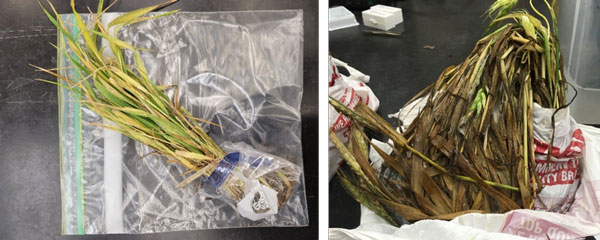The K-State Plant Disease Diagnostic Lab has added new diagnostic services and updated the fee schedule. Fees for routine diagnoses, fescue endophyte, and all nematode services remain the same (Table 1). In order to maintain the quality of our services, some fees have increased in 2023. This is primarily due to increased costs of materials and labor, but is also a reflection of our new services.
Table 1. K-State Plant Disease Diagnostic Lab Services and Fees
|
Diagnostic Service |
Internal Charges (KSRE) |
External Charges |
|
Digital Diagnosis |
$0 |
$0 |
|
Routine Diagnosis (per sample) |
$10 |
$13.50 |
|
No routine diagnosis charge when running specialized tests listed below. |
||
|
Fescue Endophyte |
$25 |
$35 |
|
Nematode – Soybean Cyst Nematode |
$25 |
$35 |
|
Nematode – Corn |
$25 |
$35 |
|
Nematode – Pine Wilt |
$25 |
$35 |
|
ELISA (wheat virus screen) |
$50 |
$70 |
|
Molecular (first/single pathogen) |
$50 |
$70 |
|
Molecular (each additional pathogen) |
$20 |
$30 |
|
Alternate Lab Testing, cost recovery |
Varies |
Varies |
ELISA fee has increased to $50 for extension and $70 for non-extension
The K-State Plant Disease Diagnostic Lab uses ELISA (a protein-based diagnostic test) to screen for wheat viruses. Previously our lab tested for five pathogens in the screen, but added a sixth in 2023. The wheat viruses that we now screen for are Wheat Streak Mosaic Virus (WSMV), Triticum mosaic virus (TriMV- new in 2023), High Plains Wheat Mosaic Virus (HPWMoV), Wheat Spindle Streak Mosaic Virus (WSSWMV), Soil-borne Wheat Mosaic Virus (SBWMV), and Barley Yellow Dwarf Virus- PAV (BYDV-PAV). This testing program begins the week of March 13.
New Molecular Service
The K-State Plant Disease Diagnostic Lab is now offering molecular diagnostics. This type of diagnostic service increases the detection capabilities of our lab, which provides diagnoses that are more precise for our clients. Examples of molecular detection include Sudden Death Syndrome of soybeans (Fusarium virguliforme), Bacterial Leaf Streak of corn (Xanthomonas vasicola pv. vasculorum or Xvv), and others.
Sample Submission – High quality samples lead to high quality diagnoses (Figure 1)
- Collect and ship samples on or before Wednesday to avoid weekend storage
- Collect healthy and symptomatic plants (labeled)
- Collect the entire plant
- Dig up plant to keep the root system intact
- Bag roots separately to avoid contact with leaves
- Place bagged roots and above ground materials in larger plastic bag
- Label and use plastic bags instead of paper and do NOT add water. This maintains sample integrity
- Once collected:
- Fill out submission form with as much information as possible. Include variety/hybrid info (especially for wheat)
- Ship plants ASAP overnight via UPS or FedEx when possible. USPS can take up to 14 days
- Send photos to clinic@ksu.edu with tracking number or date shipped
- 3 types of images
- Symptom/problem close up and in focus
- Entire plant from ground level to top of plant
- Site – capture the pattern in the field; transition areas, terraces, etc.
- 3 types of images

Figure 1. Example of following good sample collection and shipping procedures (left photo) versus bad sample collection and shipment (right photo).
Summary:
- High quality samples lead to a high quality diagnoses
- New Services
- Molecular diagnosis (increased detection capability)
- Sudden Death Syndrome
- Bacterial Leaf Streak of Corn
- Triticum mosaic virus (TriMV) added to wheat virus screen (ELISA)
- Molecular diagnosis (increased detection capability)
- Wheat Virus Screen (6 viruses – WSMV, TriMV, HPWMoV, WSSMV, SBWMV, BYDV-PAV)
- 2023 program starts Week of March 13
- Submit samples before 5pm on Wednesdays
- $50 for extension clients
- $70 for non-extension clients
- 2023 program starts Week of March 13
If you have any questions, comments or concerns, please reach out to us via clinic@ksu.edu or 785-532-6716.
Chandler Day, K-State Plant Disease Diagnostic Lab
chandlerday@ksu.edu